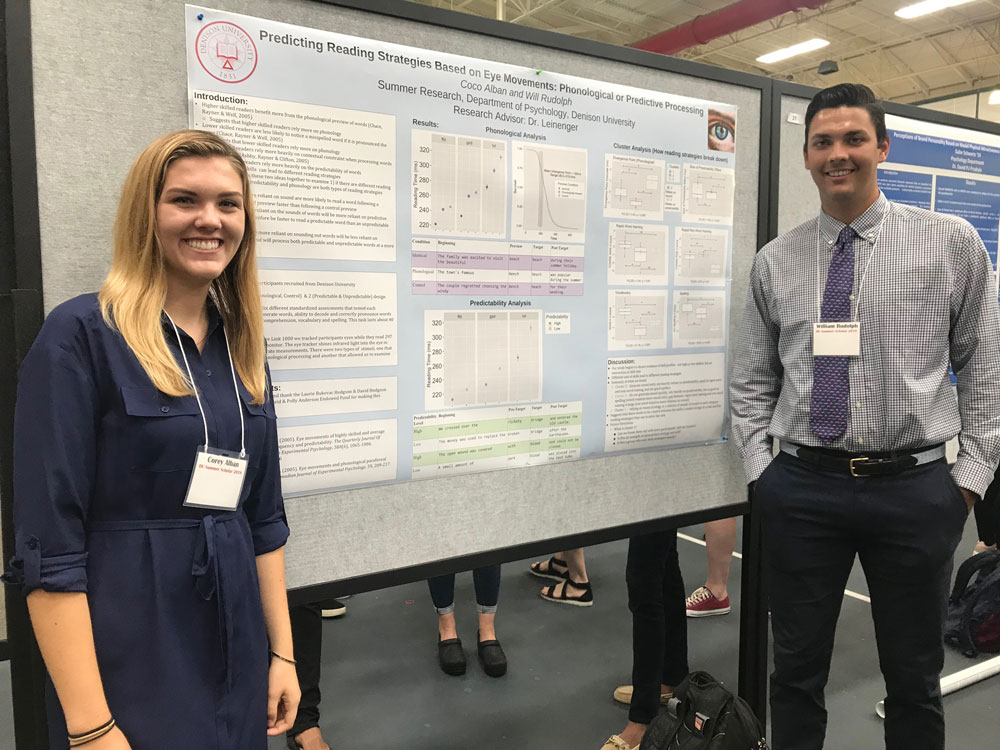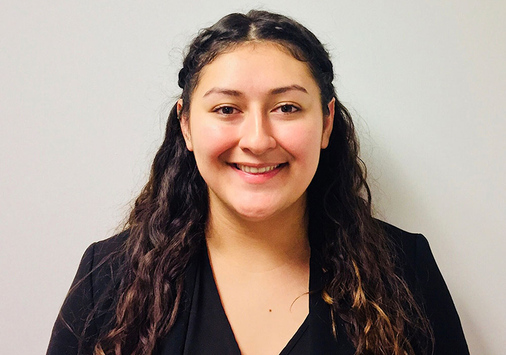Research Opportunities for Students
Coco Alban and Will Rudolph present the results of their summer research study on eye movements during reading
In the Curriculum
The Psychology Curriculum provides students with ample opportunities to become involved in psychological research. All Introductory Psychology (100) courses have weekly labs, which complement traditional lecture/discussion portions of the course. Students learn to apply basic research methods and replicate famous psychological studies. Then, Research Methods (200) provides a more extensive overview of the research designs and statistics using in behavioral research. Majors and minors then complete a series of 200- and 300-level research courses in which they design and conduct two empirical research projects each semester. Working in small groups, students participate in the entire research process, from literature review and study design to analysis and report writing. Students also present their research at a poster session or symposium at the end of each semester.
Beyond the Curriculum
Many students conduct research outside of their usual coursework. The Psychology Department offers several opportunities for students to work collaborative with faculty on empirical research.
Summer Research
The Summer Research Program permits students to pursue fulltime collaborative work with faculty members for ten weeks during the summer. This program provides students a unique venue in which to experiment with ideas, pursue an intellectual passion, and focus intently on the resolution of a question over a sustained period of time.
Students earn a stipend ($3,500) and on-campus housing during the ten-week research interval. They are also awarded a budget to fund their research and present their research at a symposium. Many students also present their work at professional conferences and some have published their research in peer-reviewed journals. Projects are supported by the Anderson and Bowen Summer Science Research Program, the Hodgson Assistantship for Disability Research, and the Psychology Department's Sharfstein Memorial Scholarship.
Senior Research
Majors who want to conduct a year-long, empirical research project in psychology may enroll in Senior Research (Psychology 451‑452). Senior Research is conducted in collaboration with a faculty committee and can be viewed as a culminating experience for majors. Typically, a Senior Research project is planned during the fall semester (Psychology 451) and conducted, analyzed, and written‑up during the spring semester (Psychology 452). Students present their findings at a research symposium and dinner at the end of the academic year.
Directed & Independent Study
Students who wish to study a topic that is not covered in the regular course offerings, or who wish to investigate in greater detail an issue examined in a specific course, may enroll in Directed Study (Psychology 361‑362) or Independent Study (Psychology 363-364). In some cases, the activity will involve extensive reading on a given topic, papers describing the results of these readings, and regular meetings with the faculty sponsor. In other cases, the student may design an empirical research project under faculty supervision.
Research Assistantships
Faculty members often welcome students to serve as research assistants on their own empirical projects. By working closely with faculty on their research, students can gain first‑hand experience about the nature of scientific investigation. Furthermore, through this collaboration, faculty members can come to know students' abilities and interests more intimately and help students discern and achieve their goals for the future.















